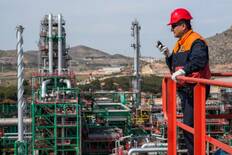
Investment and Production
Repsol is investing €200 million in constructing Spain's first advanced biofuels plant at its Cartagena refinery. The facility will produce 250,000 tons of advanced biofuels annually, including biodiesel, biojet, bionaphtha, and biopropane, starting in the first half of 2023. This production will help reduce CO2 emissions by 900,000 tons per year.
Project Scope and Timeline
The project covers four areas over 41,500 m², including a hydrotreating unit, a hydrogen production unit, and a biofuel storage tank area within the refinery, as well as a storage area at the Port Authority of Cartagena. Civil works are underway, focusing on constructing storage tanks and installing concrete structures and pipeline racks.
Employment and Economic Impact
The construction will generate around 1,000 jobs and involve 240 auxiliary companies, with 21% local, 25% regional, 42% national, and 12% international. Currently, over 25 contracting companies and approximately 300 people are working on-site, with the workforce expected to peak at 800 in the autumn.
Circular Economy and Sustainability
Repsol's project aligns with its goal of becoming a net zero emissions company by 2050. The plant will use waste from the agri-food industry and other sources, such as used cooking oils, to produce advanced biofuels. This approach supports the circular economy by giving waste a second life and reducing net CO2 emissions by 65% to 85% compared to traditional fuels.
Regulatory Alignment
The project supports EU and Spanish regulatory goals for renewable energy in transportation. The EU aims for 14% renewable energy in transport by 2030, with 3.5% from advanced biofuels. Spain's National Integrated Energy and Climate Plan targets 28% renewable energy in transportation by 2030.

